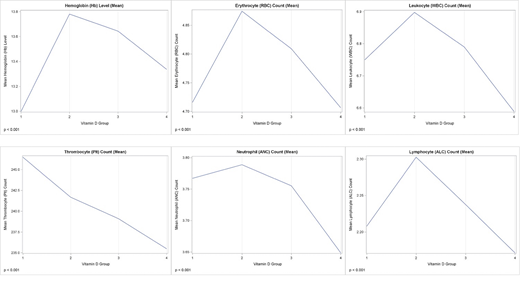
Introduction
Vitamin D deficiency is generally associated with a slowed hematopoiesis and the final outcome is varying degrees of peripheral blood cytopenia(s). The net effect of increased levels of Vitamin D is not well defined. In this study we tried to document the effect of varying levels of Vitamin D on hematological parameters.
Material and Methods
Whole patient registry of Medipol Complexes screened and a total of 12709 patients who met the pre-defined inclusion criteria enrolled in the study. Two datasets formed, first including all patients (Dataset A), second including patients with no CBC abnormality and not having any nutritional deficiency (Iron, Vitamin B12 and Folic acid).
Results
There was a statistically significant correlation between major CBC indices showing a maximum for the second pre-defined (according to quartiles 1st group included patients with a Vitamin D below 10 ng/ml, 2nd group included Vitamin D between 10-20 ng/ml, 3rd group included vitamin D between 20-30 ng/ml and the 4th group included patients who had a Vitamin d level above 30 ng/ml) Vitamin D group. This trend was statistically significant for major hematological parameters and post-hoc analysis also revealed a positive trend through Group 2 (10-20 ng/ml). Regression analysis also documented that patients who were classified under group 2 possessed a more potent hematopoiesis when compared to others even when adjusted for age, gender and baseline CRP values (Figure 1).
Conclusion
Our study reports a statistically significant correlation between major hematological parameters and Vitamin D levels in a particularly large patient population who lacks a significant confounder like chronic illnesses or conditions which can contribute and potentially serves as a bias. Even more, the group who has a maximal capacity of hematopoiesis are the ones harboring relatively normal but not high levels of Vitamin D.
No relevant conflicts of interest to declare.
Author notes
Asterisk with author names denotes non-ASH members.

This icon denotes a clinically relevant abstract


This feature is available to Subscribers Only
Sign In or Create an Account Close Modal